

Trump attacks WTO after it says US tariffs on China broke global trade rules. The United States has described the World Trade Organization as “completely inadequate” after it criticised the Trump administration’s tariffs on China.
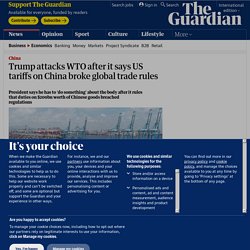
The WTO said on Tuesday that the US breached global trading rules by imposing levies on more than $200bn of Chinese goods in the opening salvo of president Donald Trump’s trade war with Beijing two years ago. The US said the tariffs were justified because China was stealing intellectual property and forcing American companies to transfer technology for access to China’s markets.
WTO faces uncertain future. It's a role that comes with a salary and allowances package of more than $500,000 and a title conferring considerable global prestige.
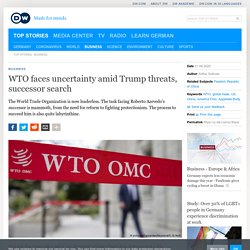
Yet whoever takes up the now vacant position of director-general of the World Trade Organization will have an unenviable job on their hands. Brazil's Roberto Azevedo, whose period in charge ended this week after seven years, has left the role a year earlier than originally planned. He said the decision was personal, but few would blame him for wanting to get out of an organization that has been beset by multiple problems and criticism in recent years. The impossible job? Deglobalisation will hurt growth everywhere. The post-pandemic world economy seems likely to be a far less globalised economy, with political leaders and publics rejecting openness in a manner unlike anything seen since the tariff wars and competitive devaluations of the 1930s.
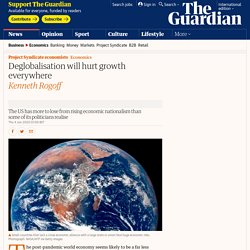
And the byproduct will be not just slower growth but a significant fall in national incomes for all but perhaps the largest and most diversified economies. The death of globalisation has been announced many times. But this is a perfect storm. Over the last half-century the world has been transformed by huge flows of trade and investment.
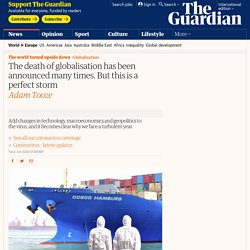
Subscribe to read. Globalization 2.0 A New Synthesis. Humans are not resources. Coronavirus shows why we must democratise work. Working humans are so much more than “resources”.
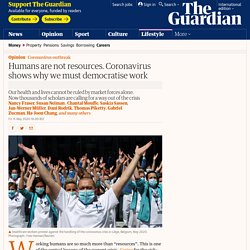
What if Covid-19 isn't our biggest threat? When eventually the coronavirus crisis begins to recede and we return to an approximation of normality – no matter how socially distanced or how much handwashing it involves – we can expect some kind of international initiative to prevent, or at least limit, the spread of future lethal viruses.
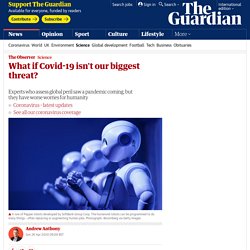
As a species we are pretty good at learning from recent experience. It’s what’s known as the availability heuristic – the tendency to estimate the likelihood of an event based on our ability to recall examples. But as the moral philosopher Toby Ord argues in his new book, The Precipice, we are much less adept at anticipating potential catastrophes that have no precedent in living memory. “Even when experts estimate a significant probability for an unprecedented event,” he writes, “we have great difficulty believing it until we see it.” Our politics isn’t designed to protect the public from Covid-19.
The worst possible people are in charge at the worst possible time.
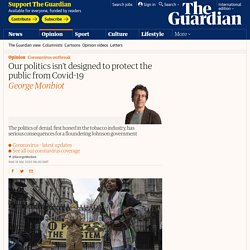
In the UK, the US and Australia, the politics of the governing parties have been built on the dismissal and denial of risk. Just as these politics have delayed the necessary responses to climate breakdown, ecological collapse, air and water pollution, obesity and consumer debt, so they appear to have delayed the effective containment of Covid-19. I believe it is no coincidence that these three governments have responded later than comparable nations have, and with measures that seemed woefully unmatched to the scale of the crisis. The UK’s remarkable slowness to mobilise, followed by its potentially catastrophic strategy – fiercely criticised by independent experts and now abandoned – to create herd immunity, and its continued failure to test and track effectively or to provide protective equipment for health workers, could help to cause large numbers of unnecessary deaths. Brexit (remember that?)
Coronavirus won’t end globalisation, but change it hugely for the better. In 2008, the world successfully pulled together – with Britain playing a catalytic role – when faced with the threat of financial collapse.
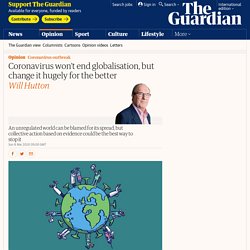
In 2020, confronted with the threat of a global pandemic, it is every country for itself. Of course there’s a globalisation backlash. It has failed billions of people. Over the past 30 years China has become the world’s factory.
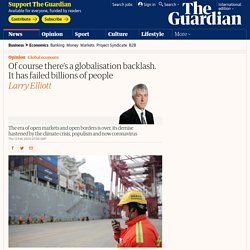
For the past few weeks, the production line has been shut down by plant closures deemed necessary to halt the spread of coronavirus. Beijing fears there will be both short- and long-term damage from the outbreak. The country is on course for its first quarter of negative growth in decades, while earlier this week China’s ambassador to the World Trade Organization (WTO) called on other countries not to use coronavirus as an excuse to put up trade barriers. The fact that Zhang Xiangchen felt the need to make this appeal speaks volumes. China suspects there will be backdoor protectionism – and it is almost certainly right, because for years countries around the world have needed little encouragement to resort to protectionism. Today, governments are less interested in breaking down barriers and more concerned about safeguarding jobs, preventing intellectual property theft and the risk of cyber crime. Globalisation once made the world go around. Is it about to grind to a halt?
His speech was like one normally expected of an American president.
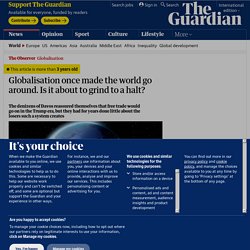
Countries must resist the temptation to retreat into harbour, the world leader said to a packed and admiring audience, but instead have the courage to swim in the vast ocean of the global market. This was the kind of paean to free trade that might have come from John F Kennedy, George W Bush or Bill Clinton – all occupants of the White House who saw it as the United States’s role to defend the open international trading system set up at the end of the second world war. This, though, was China’s president, Xi Jinping, in Davos last week, making it clear that he was prepared to fill the vacuum if Donald Trump went ahead with the sort of protectionist policies he had proposed in his election campaign.
Theconversation. With almost half the world’s population now online, attempts to spread the internet continue unabated. The likes of Facebook and Google offer data services for “free”, while satellites, drones, and balloons are used to cover those places that traditional technologies have not been able to reach. Underlying this agenda is a rationale that the spread of the internet leads directly to economic growth and development. It may be unsurprising to hear such an argument from Silicon Valley types. Opinion: globalisation - implications of TTIP for weaker economies. The Transatlantic Trade and Investment Partnership (TTIP) and the Trans-Pacific Partnerhsip (TPP) are quickly becoming the subject of increased interest and criticism.
These two trade deals – the former being discussed between the US and Europe, and the latter between the US and Asian nations including Japan and South Korea – stand to change the face of global trade. Opinion: TTIP and the power of corporations. PLOS Medicine: Trans-Pacific Partnership Provisions in Intellectual Property, Transparency, and Investment Chapters Threaten Access to Medicines in the US and Elsewhere. Citation: Baker BK (2016) Trans-Pacific Partnership Provisions in Intellectual Property, Transparency, and Investment Chapters Threaten Access to Medicines in the US and Elsewhere. PLoS Med 13(3): e1001970. doi:10.1371/journal.pmed.1001970 Published: March 8, 2016 Copyright: © 2016 Brook K. Baker. This is an open access article distributed under the terms of the Creative Commons Attribution License, which permits unrestricted use, distribution, and reproduction in any medium, provided the original author and source are credited. Funding: No funding was received for this work.
Competing interests: The author has declared that no competing interests exist. Abbreviations: IP, Intellectual Property; ISDS, investor-state-dispute-settlement; R&D, research and development; TPP, Trans Pacific Partnership Agreement; TRIPS, Trade Related Aspects of intellectual Property Rights; USTR, US Trade Representative; WTO, World Trade Organization Provenance: Commissioned; externally peer reviewed.
Article: A proposed approach to systematically identify and monitor the corporate political activity of the food industry with respect to public health using publicly available information - Mialon - 2015 - Obesity Reviews. The corporate determinants of health: how big business affects our health, and the need for government action! - PubMed - NCBI. Food supply, nutrition and trade policy: reversal of an import ban on turkey tails. Article: Food industry: friend or foe? Article: The global obesity pandemic: shaped by global drivers and local environments.
Lessons from interactions between public health and the food and drinks industry. The health impact of trade and investment agreements: a quantitative systematic review and network co-citation analysis. Regional trade and investment agreements (RTAs) are increasingly being used to promote international integration and economic growth.
This has taken particular prominence as world trade has slowed in the wake of the 2008 global financial crisis: in 1990 there were 22 bi-lateral and regional RTAs, which rose to over 270 by 2016, as shown in Fig. 1 [1, 2]. Two large RTAs have been at the centre of recent negotiations: the Trans-Pacific Partnership, between the US and 11 Pacific Rim countries, signed in February 2016; and the Transatlantic Trade and Investment Partnership, between the US and the European Union (EU), signed in October 2016 [3]. These RTAs are as much about facilitating trade as reducing barriers to investment, such as by creating investor protections and by enabling private companies to participate in public sector procurement [4].
Concerned public health advocates argue that RTAs pose health risks through a number of mechanisms. The wildcat gold miners who get rich sick. Time. Is fair trade finished? It wasn’t very long ago that a banana was just a banana – just a curved, yellow fruit. All you knew, if you bought a bunch in 1986, was that they cost around 97p per kilo. You weren’t told if they were organic or pesticide-free. You didn’t know if they came from Costa Rica or the Dominican Republic. And you certainly weren’t invited to worry about the farmers who grew them – or if their children went to school, or whether their villages had clinics. Hold my beer: how it all went wrong for Heineken in Africa. Heineken has made a lot of money in Africa © Max Pixel Heineken is a global powerhouse. The Dutch beer brewer is responsible for Amstel, Tiger, Desperados, Foster’s and Strongbow in Europe, as well as the Heineken brand itself.
Overseas its operation extends across Asia and the Americas—as well as Africa, where it has 40 breweries in 16 countries. Lauded in 2013 by Heineken CEO Jean-François van Boxmeer as “the international business world’s best kept secret,” Africa is central to the company’s success. Low production costs mean that beer sold there is almost 50 per cent more profitable.
A 25-year battle to improve the image of McDonald’s - Bartleby. The way we eat is killing us – and the planet. Cue howls of indignation from big food and its cheerleaders, the libertarian right. How diplomatic missions became entangled with the tobacco industry. Fyre festival fiasco: exploitation of Caribbean islanders highlights colonial legacy of tourism. Luxury, consumption, hedonism and sexual conquest are all tropes that have been long associated with travel to the Caribbean. The 2017 luxury music event Fyre Festival, masterminded by rapper Ja Rule and entrepreneur Billy McFarland, repackaged these tropes for a millennial market. But thanks to drastically insufficient planning, the fantasy turned into a nightmare, as would-be attendees were stranded in Grand Exuma without sufficient water, food or shelter. Interview: BBC Radio 4 - The Life Scientific, Susan Jebb - Engaging with the food industry.
Leaked: Coca-Cola’s Worldwide Political Strategy to Kill Soda Taxes. The emails describe a wide-range of Coca-Cola actions Kyle Pfister/Medium Internal emails recently leaked to “DCLeaks” give the public new insight into Coca-Cola’s coordinated strategy to defeat public health policies at the local, state, national, and international levels. Pierce Brosnan orders ‘pan masala’ brand to remove his image after prompting criticism in India. Pierce Brosnan has accused the Indian brand Pan Bahar of deceptively using his image to promote a controversial product which many in the country associate with an addictive form of tobacco. Obesity Was Rising as Ghana Embraced Fast Food. Then Came KFC. - The New York Times. Food supply, nutrition and trade policy: reversal of an import ban on turkey tails. Nestlé to remove 10% of sugar from all snacks in UK and Ireland by 2018. Nestlé, one of the world’s biggest chocolate manufacturers, will take 10% of the sugar out of its confectionery in the UK and Ireland by 2018.
The corporation says the cut is from the levels existing in its sugary products in 2015 and will amount to about 7,500 tonnes. It makes several well-known brands, including Aero, Dairy Box, Drifter, KitKat, Lion, Milkybar, Munchies, Polo, Quality Street, Rolo, Smarties, Toffee Crisp, Walnut Whip and Yorkie. Obesity, junk food, "bliss point" and aggressive marketing. People in the UK are hooked on takeaways and microwave meals, or so we are constantly told by TV chefs and the media.
This apparent addiction to fast food is leading to an obesity epidemic. Bangkok Post: lifestyle. A new excise tax will be provisionally introduced in September. Britain Is The ‘Fat Man Of Europe’: So Why Won’t Government Invest In Healthier Food? BBC Newsnight: how companies are bending the rules on junk food advertising. Article: Improving diet and physical activity: 12 lessons from controlling tobacco smoking. The Real Cost of Food - can taxes and subsidies imrove public health? JAMA article. How alcohol industry organisations mislead the public about alcohol and cancer - Petticrew - 2017 - Drug and Alcohol Review.